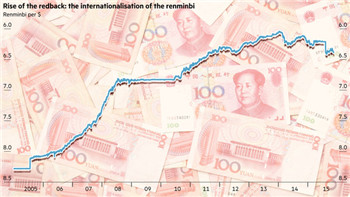(单词翻译:单击)

Nowhere in the global economy today is China more of a force than in the world of trade. That fact alone seems destined to propel the march of the renminbi, once considered an exotic currency, further into the mainstream.
在当今全球经济,中国在贸易领域的实力尤其强大。这一事实本身似乎就注定会推动曾被视为冷门货币的人民币进一步跻身于主流。
China is now the largest exporter by some margin. Economists at the World Trade Organisation predict that its exports will account for more than 14 per cent of the value of goods exported around the globe by year-end, up from a little over 6 per cent a decade ago.
中国现在是遥遥领先的最大出口国。世界贸易组织(WTO)经济学家,预测到今年年底,中国的货物出口总值将占到全球的14%以上,十年前这一数字仅为6%出头。
China is also on course to topple the US from its perch as the biggest importer, and accounted for just over 10 per cent of the value of imports around the world this year.
中国还将超越美国成为最大进口国,今年中国的货物进口总值占全球的10%出头。
China’s emergence in the past decade as the leading trading nation has expanded the role of the renminbi to such an extent that in 2013, the currency overtook the euro as the world’s second choice in trade finance after the dollar, according to Swift, the global payments house.
过去十年中国作为主要贸易大国的崛起,极大地提高了人民币的地位。全球支付服务提供商——环球银行金融电信协会(SWIFT)数据显示,2013年人民币超越欧元,成为全球贸易融资的第二大选择,仅次于美元。
In Asia, the renminbi is now the leading option for commerce between China and regional partners such as South Korea. Trade payments in renminbi to China and Hong Kong now account for almost a third of transactions, says Swift, compared with just 7 per cent three years ago.
在亚洲,人民币现在是中国与韩国等区域合作伙伴之间贸易的首选货币。SWIFT数据显示,中国内地和香港现在的贸易有近三分之一以人民币结算,而三年前仅为7%。
The renminbi could cross a more significant symbolic threshold as the International Monetary Funds is set to go ahead with a widely anticipated decision to add the Chinese unit to its elite basket of global reserve currencies used to value its Special Drawing Rights (SDRs), currently the preserve of the British pound, the US dollar, the euro and the yen.
随着国际货币基金组织(IMF)如普遍预期的那样,决定将人民币纳入其全球储备货币精英篮子,人民币跨越了象征意义上的更重要的门槛。IMF的货币篮子用于为其特别提款权(SDR)确定价值,目前里面的成员有英镑、美元、欧元和日元。
Stuart Tait, global head trade for HSBC, argues that using the renminbi in trade transactions no longer seems like an exotic idea. During a recent visit to China’s Pearl River Delta, a region where many export-focused companies are based, he was struck by how much the conversation had changed. “We talked about Rmb exposure in the way you would about any currency. It wasn’t this unique frontier issue,” Mr Tait says.
汇丰(HSBC)全球贸易主管斯图尔特泰特(Stuart Tait)认为,人民币用于贸易结算已不再被视为一个奇葩想法。斯图尔特泰特近期访问了中国珠三角地区,那里聚集着大量出口企业,他对人们口气的改变留下深刻印象。他说:“我们谈论人民币的敞口,就像谈论任何一种货币的敞口一样。这已不再是一个独特的前沿问题。”
His belief that the renminbi’s role in global trade is likely to continue to grow was bolstered by an HSBC survey of 1,600 executives in 14 different markets in January and February that showed more than half expect to begin using the currency more in transactions.
斯图尔特泰特认为,人民币在全球贸易中的地位很可能会继续提升,该观点得到汇丰一项调查的支持。汇丰在今年1月和2月调查了14个不同市场的1600名高管,过半数调查对象预计在交易中会越来越多地使用人民币。
However, while there is no doubt the renminbi is growing in stature, its ascent has not gone entirely unchallenged.
然而,尽管人民币的地位无疑将越来越高,但它的崛起并非不受挑战。
The euro’s role in trade has staged something of a comeback as its value has fallen and German exports have risen.
随着欧元贬值,德国出口增长,欧元在贸易中的地位上演了一波反弹。
The HSBC survey also showed that not everyone is equally confident in the renminbi. Executives in Taiwan and Germany were more hesitant about the currency than more bullish peers in the UK, for example. Mr Tait believes that companies would be more comfortable if deeper renminbi markets developed around the world, offering greater liquidity.
汇丰的调查还显示,并不是所有人都对人民币同样有信心。比如在台湾和德国,高管们对人民币的态度就较为迟疑,不像英国的高管那样乐观。泰特相信,如果更具深度的人民币市场能够在世界各地发展起来,提供更大的流动性,企业将会感到更放心。
There are also questions over whether some of the numbers used to support the more confident narratives over the renminbi truly reflect reality.
也有人质疑,被用来加强人们对人民币信心的某些数据是否如实反映了现实?
Swift says the renminbi is the currency behind almost 10 per cent of the trade carried out with letters of credit. But much of that trade is between mainland China and Hong Kong, or the mainland and Taiwan, and there have long been suspicions of significant “mis-invoicing” to evade capital controls.
Swift表示,近10%以信用证结算的贸易使用的是人民币。但这些贸易有很多发生在中国内地与香港,或中国大陆与台湾之间,而且一向有人怀疑这些贸易存在大量“虚开发票”现象,目的是规避资本管制。
When the IMF examined the role of the renminbi earlier this year as part of its review of whether to grant the currency SDR membership, it treated letters of credit between China and both Hong Kong and Taiwan as domestic trade. By that measure, the renminbi was behind just 3.8 per cent of the global value of letters of credit, which are dominated by the dollar.
今年早些时候IMF对人民币的作用进行了审查,作为其决定是否授予人民币SDR成员资格的考察的一部分,当时IMF将中国与香港和台湾之间的信用证结算贸易归类为国内贸易。按照这种计算方法,人民币在美元主导的全球信用证结算总额中仅占3.8%。
Volatility in China’s markets over the summer and swings in the renminbi linked to the August announcement by the People’s Bank of China that it was changing the way the currency’s daily trading band is set have also caused concerns among investors.
让投资者担忧的还有今年夏季中国市场的波动,以及8月因中国人民银行(PBoC)宣布改变每日人民币中间价设定而引发的人民币汇率震荡。
China may be slowing. But, as Mr Tait points out, it is still growing faster than any advanced economy.
中国经济增速可能正在放缓。但正如泰特所指出,其增速依然快于任何发达经济体。
“It’s about keeping it all in context,” he says. “The Chinese growth in trade will continue to outpace global growth.”
泰特说:“关键是要客观地看待一切。中国的贸易增长将继续超越全球增长。”
And for a currency that has been building its place in the global economy on the back of trade, that is likely to mean a growing role for many years to come.
对于借助贸易在全球经济中确立了自身地位的人民币,这很可能意味着未来多年其地位将越来越高。


